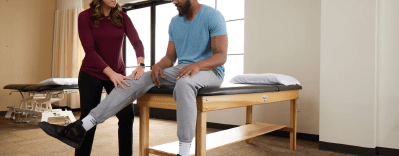What is the Work & Industry Program?
The financial impact of lost productivity after a workplace injury often surpasses the cost of direct medical cost. Our primary goal is to help prevent injuries from happening on the job. If an injury does occur, our goal is then focused on helping the injured worker return to their productive and fulfilling work and personal life. We work to ensure that your organization’s workforce is safe and productive. All of our services are delivered with licensed clinicians and have been demonstrated to consistently reduce employer costs.
Our Programs Include:
- Physical and Occupational Therapy – Physical and Occupational Therapy for the Injured Worker focuses on return to work. Clinicians test lifting tolerance, static and dynamic postures regularly to accurately assess work readiness. The treatments are designed to actively engage the Injured Worker and simulate job-specific tasks. Communication with stakeholders occurs during the entire plan of care.
- Functional Capacity Evaluations (FCEs) – An FCE is a comprehensive series of functional tests that objectively measure a client’s safe physical abilities. We provide a valid, unbiased, defensible, and objective evaluation of an individual’s safe functional abilities and work tolerance. Restrictions can be suggested if requested. This service is only administered by FCE trained therapists.
- Impairment Ratings – Impairment ratings are used to quantify as percentage of the amount of whole body impairment. It can be provided using the 4th, 5th or 6th editions of the AMA Guides® To The Evaluation Of Permanent Impairment.
- Work Conditioning – Work conditioning is a program designed to maximize work abilities by integrating education, aerobic exercise, stretching, strengthening, and functional task training to optimize safe return to work.
- Early symptom intervention – A program designed to alleviate the first signs of musculoskeletal discomfort to help maintain an organization’s workforce. This program is designed to address mild to moderate issues and can be provided at one of our clinics or on-site with an employer by one of our skilled professionals.
- Work Hardening
- Pre-shift stretching programs – Clinicians observe a specific job taking note of posture, repetition, and movements. Our experts then tailor specific stretches and exercises for each job based on which muscle groups are used most often. This program involves setting up a short series of job-specific activities and stretches designed to address the problems that can occur with certain job tasks. Experts then train team leaders to effectively “coach” the routine.
- Ready-for-work program – The Ready for Work program is set up to help employers get their new employees ready to do the job. This program is geared towards improving the new employee’s readiness to handle a full day’s work no matter their work history. The program is designed on the periodization principle for readying an employee to handle the work load. By determining the overall workload required, we design a program that gets the employee ready day by day by increasing their exertion levels as well as working on general strengthening, flexibility, and cardiovascular health. The program is customizable and can range from 2 to 4 hours for 1 to 2 weeks.
Job Site Analysis Includes:
We assist employers in the prevention of work-related musculoskeletal disorders through several early intervention and job site analysis programs to help employers avoid more serious workers’ compensation claims by creating a safer work environment.
- Job demands analysis – A job demands analysis is an objective measurement of the essential job functions. Essential job functions are the physical demands that are critical to perform a position. We focus on the purpose of the job and the role of the physical demands.
- Risk analysis – A quantitative risk analysis can be performed on the data collection upon request. This can assist in establishing safe productivity standards and minimizing risk across a work population through administrative and engineering controls.
- Ergonomic analysis – An ergonomic analysis is objective data collection to determine if the essential functions of a job expose the employee to an increased potential for injury and provide recommendations to mitigate risk.
Employment Testing Includes:
We design, implement, and perform employment tests that are in compliance with the Americans with Disabilities Act (ADA) and the Equal Employment Opportunity Commission (EEOC) to determine the position’s essential job functions and ensure employers are hiring candidates that match the physical demands of each position.
- Post-offer testing – The Post Offer Employment Test (POET) is an evaluation of a conditional new hire’s ability to perform the physical demands of the job with or without reasonable accommodation. The POET is developed specifically from an onsite Physical Demands Analysis, which outlines the essential demands of each job/position. Utilizing this testing can ensure the company’s contingent employees are capable of performing the required physical demands of the job safely.
- Fit-for-duty testing – A Fit for Duty test is designed to confirm that the employee is able to perform essential job functions and ensure safe work capability. This test should be used when there is a reasonable belief that the ability to perform the essential job functions has been impaired due to a medical condition OR when there is a request for a reasonable accommodation.
- Physical agility testing – Test conducted on all employees in a given position to reassess safe performance of essential job demands. This test should be used for reoccurring physical testing based upon employer needs OR for internal transfer to a new position.
What Makes Our Work & Industry Services Different:
We provide evidence-based hands-on care designed to facilitate a timely return to work, with incomparable access to care as part of Upstream’s family of brands. Our clinics offer quick and efficient scheduling within 24 to 48 hours with the option of centralized scheduling. Our therapists focus on the injured workers’ functional goals with a rapid progression of care and a de-emphasis on passive treatments and modalities. Our assessments are thorough and we always include documentation of functional tolerances to ensure the injured workers’ safe return to work. We provide clear and concise communication to appropriate the stakeholders which includes the identification of red flags and non-compliance along with written progress reports every sixth visit or 14 days (whichever is sooner).
Ready to Begin Care?
To get started, please fill out the workers’ compensation authorization form below and email the completed form to: WCScheduling@urpt.com. Thank you!
What to Expect
Every patient has a unique health history, diagnosis and personal goals. When you come for your first appointment, we will create a personalized treatment plan for you.
We work with most major insurance providers and do our best to help keep the paperwork pain-free. If you’d like to confirm your insurance coverage, please let us know and we can verify when you schedule. If your insurance provider requires a co-pay, we will ask for this payment at each visit. We accept payments by cash, check or credit card.
When to Arrive
On average, a patient’s first visit lasts about an hour. We typically ask patients to arrive 15 minutes early to sign-in, complete paperwork and/or change clothes.
What to Bring
On your first visit, you’ll need to bring your physician referral or prescription (if needed), your insurance card, your primary registration forms, your ID or driver’s license and your co-payment (as applicable). If desired, you may bring a change of clothing.
How it Works
During your first visit, your physical therapist will do an initial evaluation and discuss your plan of care. The therapist uses this information to set goals for your continued treatment. Physical therapy goals may include improved movement, strength, endurance and flexibility, as well as decreased pain. Your subsequent visits will focus on treatment that is based on your diagnosis and individualized goals.

























